unit2 poems(整)(广东省广州市)
文档属性
| 名称 | unit2 poems(整)(广东省广州市) |
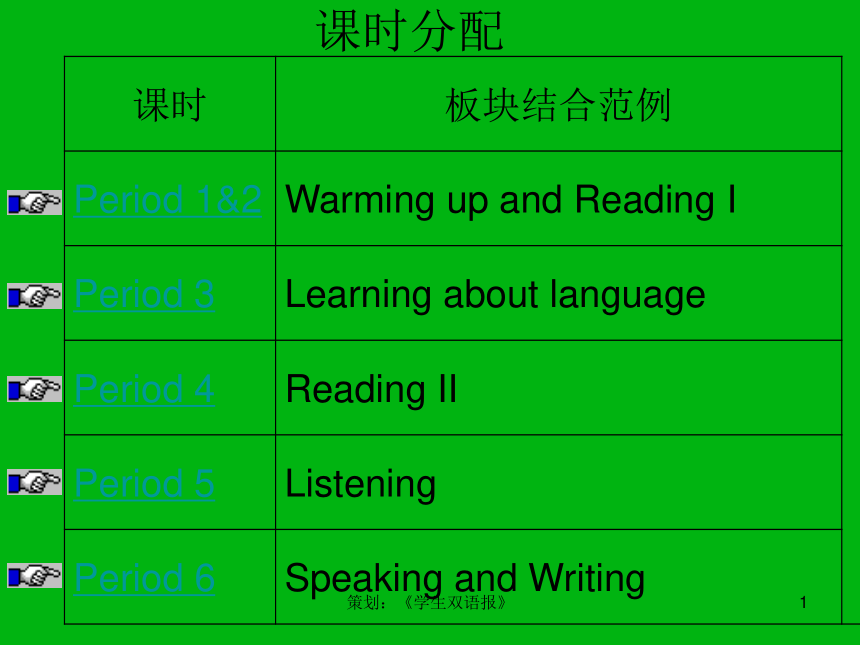
|
|
| 格式 | rar | ||
| 文件大小 | 5.4MB | ||
| 资源类型 | 教案 | ||
| 版本资源 | 人教版(新课程标准) | ||
| 科目 | 英语 | ||
| 更新时间 | 2007-12-11 00:00:00 | ||
图片预览

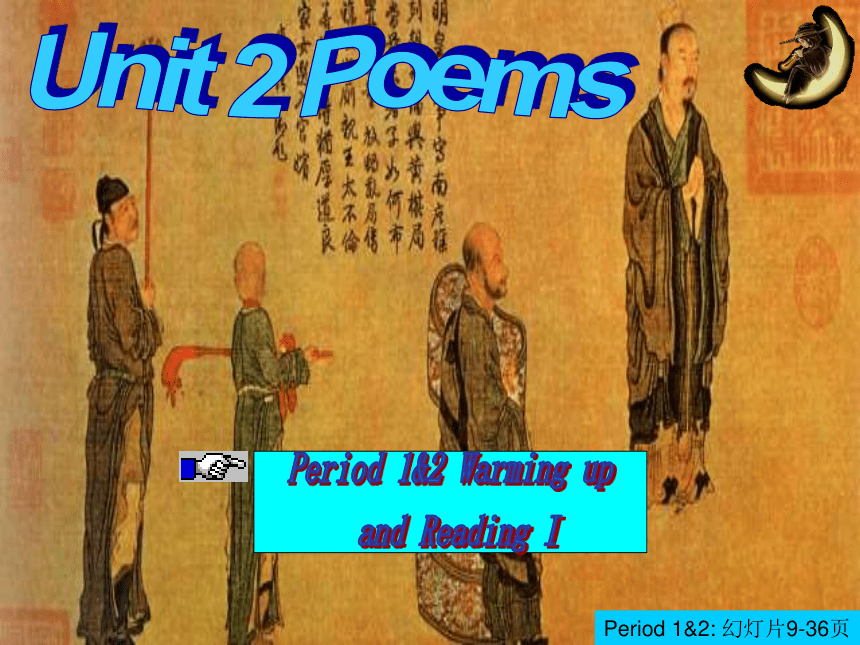
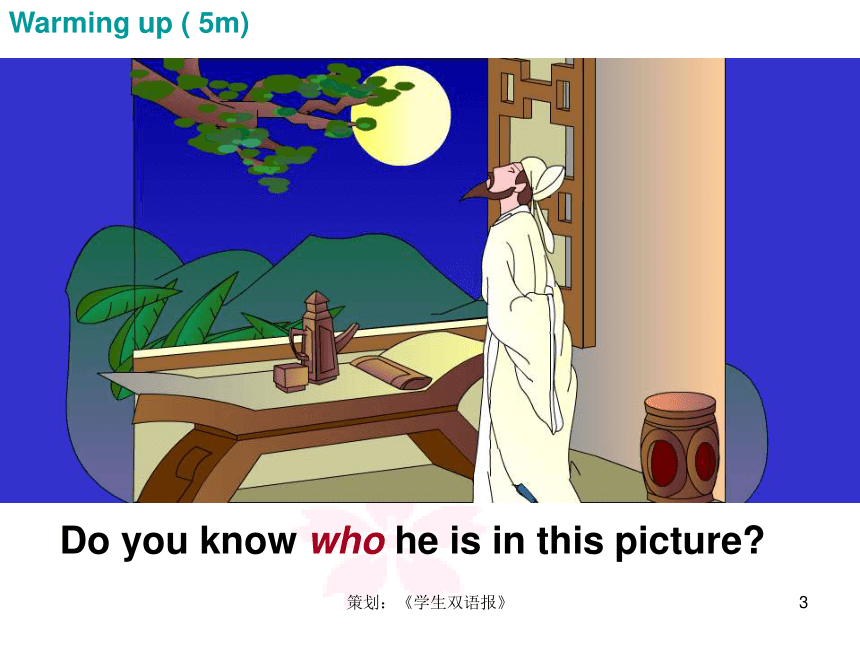
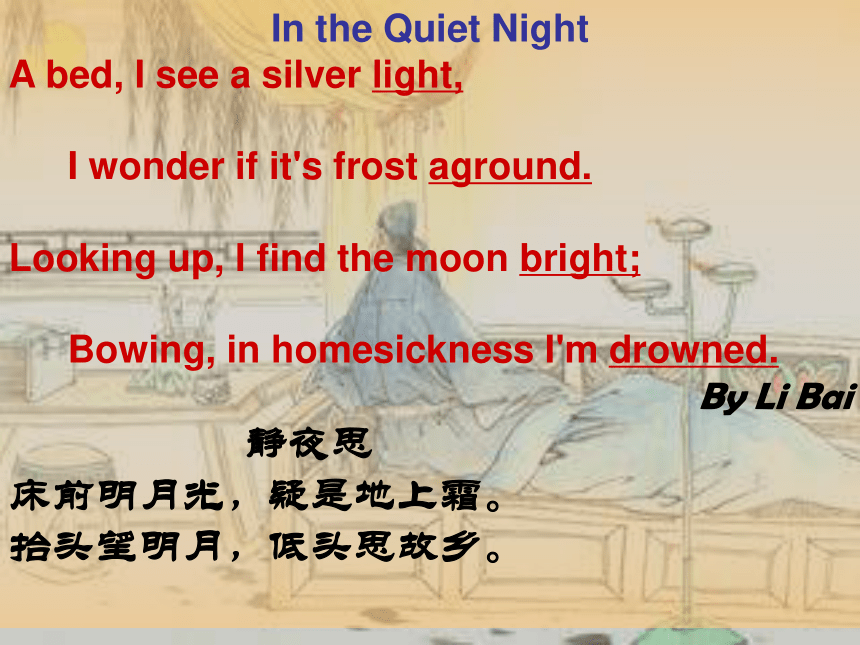
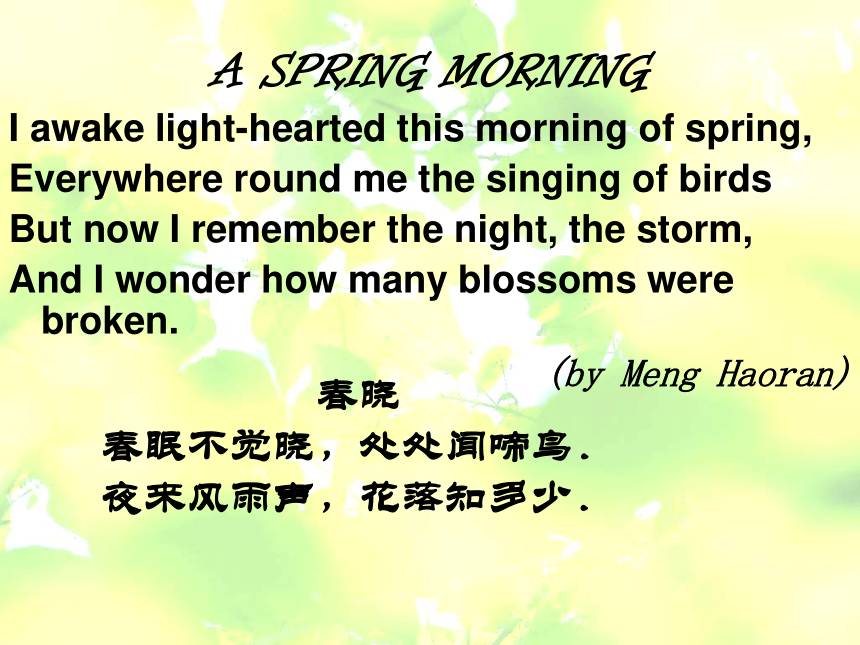
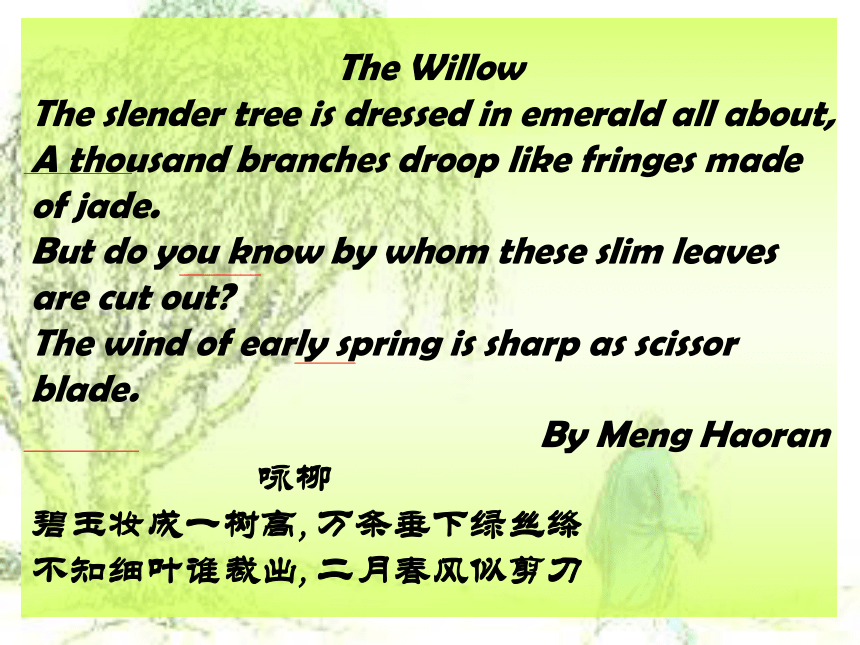
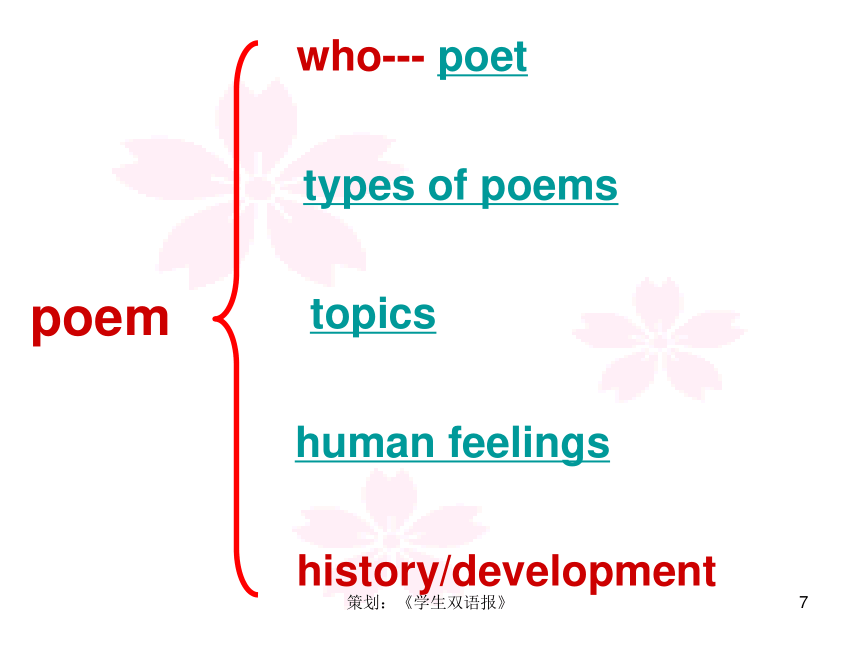
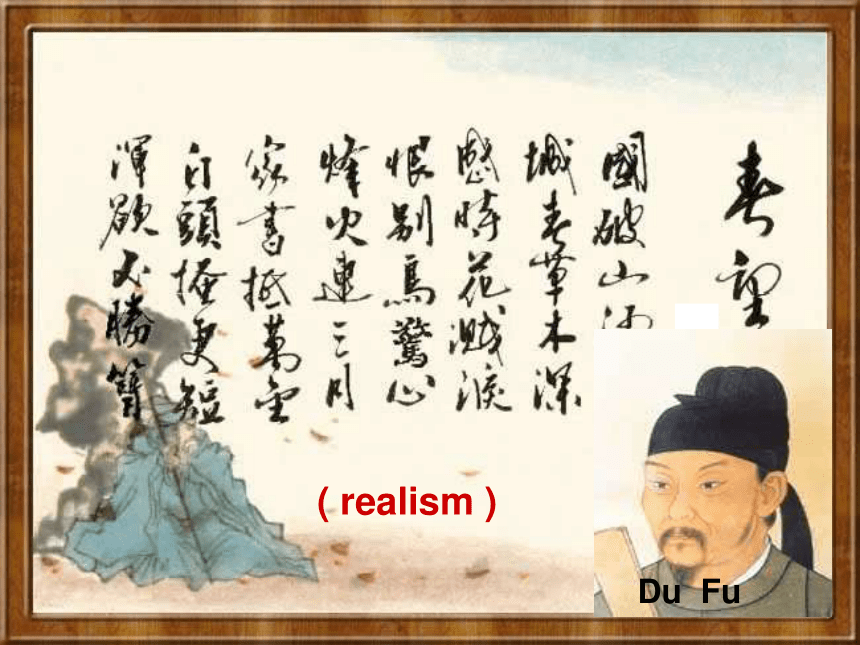
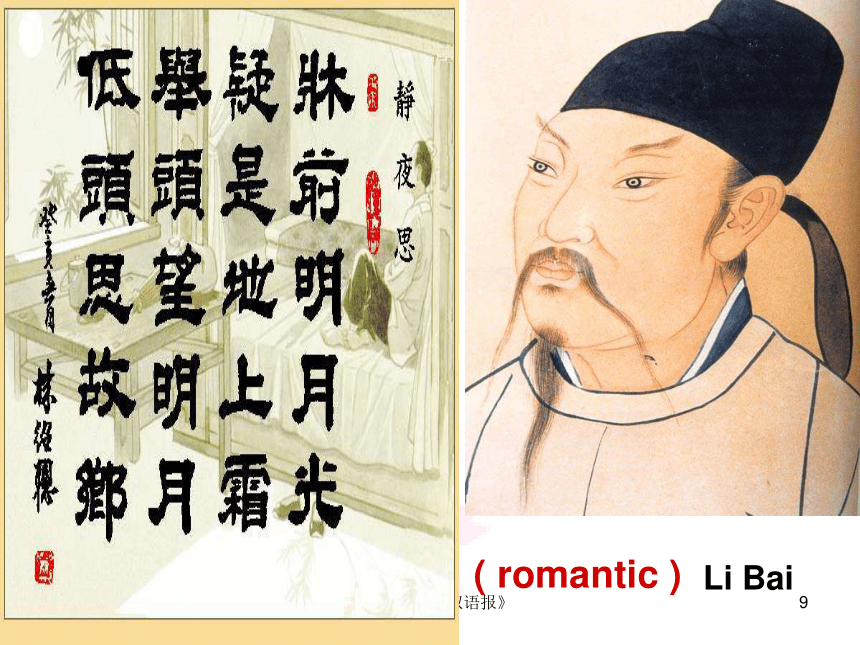
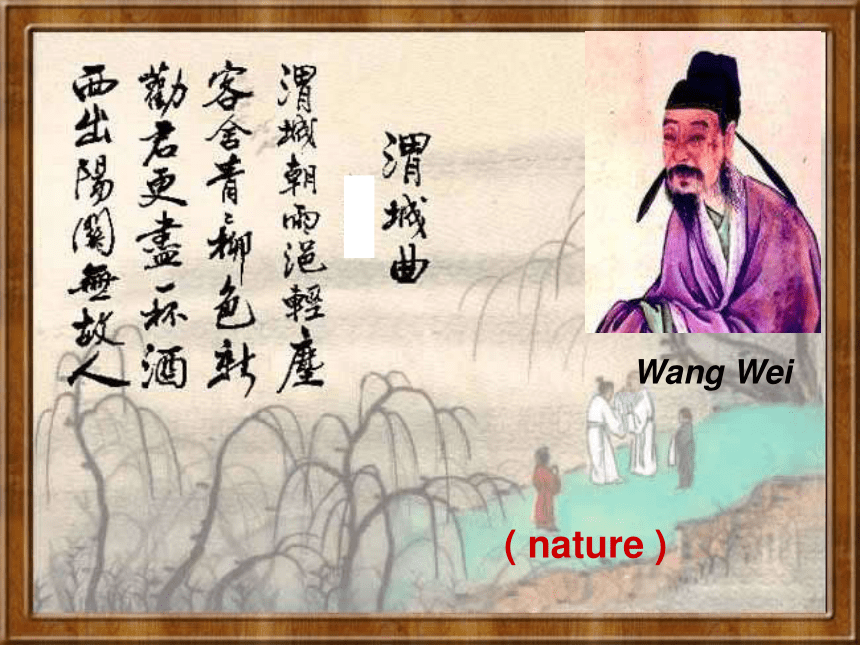
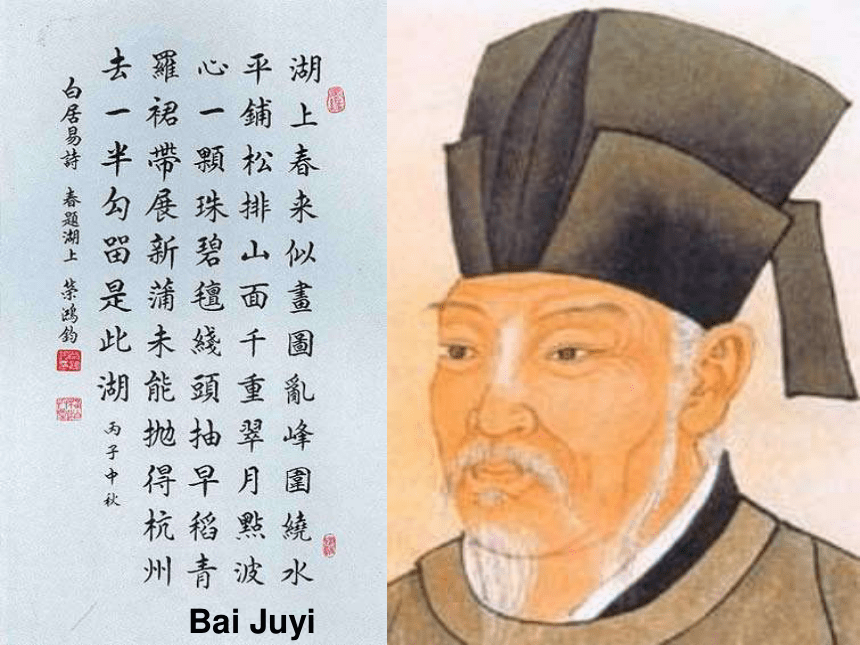
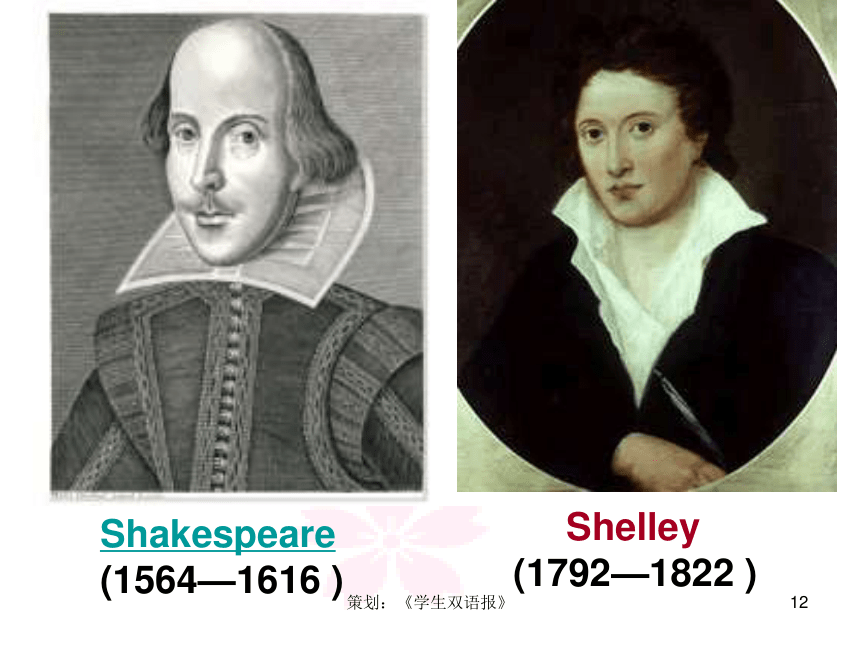
文档简介
课件93张PPT。策划:《学生双语报》1课时分配策划:《学生双语报》2Period 1&2: 幻灯片9-36页Period 1&2 Warming up
and Reading IUnit 2 Poems 策划:《学生双语报》3Do you know who he is in this picture?Warming up ( 5m)策划:《学生双语报》4In the Quiet Night
A bed, I see a silver light,
I wonder if it's frost aground.
Looking up, I find the moon bright;
Bowing, in homesickness I'm drowned.
By Li Bai
静夜思
床前明月光,疑是地上霜。
抬头望明月,低头思故乡。
策划:《学生双语报》5A SPRING MORNING
I awake light-hearted this morning of spring,
Everywhere round me the singing of birds
But now I remember the night, the storm,
And I wonder how many blossoms were broken.
(by Meng Haoran)春晓
春眠不觉晓,处处闻啼鸟.
夜来风雨声,花落知多少.策划:《学生双语报》6
The Willow
The slender tree is dressed in emerald all about,
A thousand branches droop like fringes made of jade.
But do you know by whom these slim leaves are cut out?
The wind of early spring is sharp as scissor blade.
By Meng Haoran
咏柳
碧玉妆成一树高, 万条垂下绿丝绦
不知细叶谁裁出, 二月春风似剪刀
策划:《学生双语报》7poemwho--- poettypes of poemshistory/developmenttopics human feelings策划:《学生双语报》8Du Fu( realism )策划:《学生双语报》9Li Bai ( romantic )策划:《学生双语报》10 ( nature )Wang Wei策划:《学生双语报》11Bai Juyi策划:《学生双语报》12Shakespeare
(1564—1616 ) Shelley
(1792—1822 )策划:《学生双语报》13TypesfunnyseriousrealismfantasyromanticclassicalmodernSong/Tang Dynasty策划:《学生双语报》14the sea
drinking wine
World War Ⅰ power
friendship pets
the countryside imagination
peace nature…Topics策划:《学生双语报》15Human feelingslovedeathhappinesssadnessbroken heartangerhomesick策划:《学生双语报》16As we know, poems are mostly written to
show people’s emotions.. In Chinese , we
have “ 诗言志,诗言情,诗歌合为事而作.”
That is, people write poems for different
reasons, then we have different kind of
poems.
Next go over quickly the poems in
the reading part. And then tick the correct box/boxes for each question on P9Pre-reading---(1m)策划:《学生双语报》17Nursery RhymesStrong rhythm and rhyme, a lot of repetition, easy to learn and to reciteList PoemsRepeated phrases and some rhymeCinquainMade up of five lines, convey a strong picture in just a few words.HaikuMade up of 17 syllables; Give a clear picture and create a special feeling in just a few words.Tang PoemsThe translations have a free form.What kinds of poem are mentioned?
What are their characteristics?策划:《学生双语报》18Read for detailed information√√√√√√√√√策划:《学生双语报》19Read for detailed information√√√√√√策划:《学生双语报》20Answers to questions on page 12
Poem A1.If the mirror gets broken , the baby’s father
will buy a billy-goat instead.2.If the goat runs away, the baby’s father will
buy another goat.策划:《学生双语报》21Poem C1.The speaker is writing about football.2.No, his and her team didn’t win.3.The player didn’t win because: Jack didn’t
score that goal; they didn’t have enough time;
they hadn’t train hard.4.The speaker doesn’t really believe his or her
own excuses, because there has too many ifs…5.Yes. I always give excuses when I don’t win
or do something./ No. I’ve given any excuses
when I don’t win or do something.策划:《学生双语报》22Poem H
1.The poem tells a story about a woman who
was waiting on the mountain top for her hus-
-band.
The story goes like this: A loyal wife kept standing on a mountain top waiting for her husband’s coming back. Year after year, the wife became a stone which looks like a woman watching into far distance.策划:《学生双语报》232.Woman has the feeling of:
Loneliness: she was alone watching her hus-
-band on the mountain top
Love: she waited year after year despite wind
and rain.
Trust: she believed her husband would come
back one day.
Sorrow: year after year ,she waited and
waited without seeing any hope
of her husband’s coming back, she
was very sad.策划:《学生双语报》24Baa, baa, black sheep, Have you any wool? Yes sir, yes sir, Three bags full; One for the master, And one for the dame, And one for the little boy Who lives down the lane.Let's appreciate more策划:《学生双语报》25As I was going to St. Ives, I met a man with seven wives. Each wife had seven sacks, Each sack had seven cats, Each cat had seven kits. Kits, cats, sacks, and wives, How many were going to St. Ives? Back策划:《学生双语报》26Hickory, dickory, dock, The mouse ran up the clock. The clock struck one, The mouse ran down! Hickory, dickory, dock.I scream, You scream, We all scream, For ICE CREAM!Back策划:《学生双语报》27Discussion: Are poems good for our life?
What can we get from poems?1. Poems bring passion (激情)to our life.2. Poems help us to understand life, virtues, beauty and romance. 3. Poems make us know we are here and that we can make our life and the world more colorful and beautiful!策划:《学生双语报》28Homework Surf the Internet to find more information about POEMS and you are expected to present it to your peer in the next class.策划:《学生双语报》29Language points for reading I策划:《学生双语报》30Take a break!策划:《学生双语报》31Period 3: 幻灯片38-58页Unit 2 Poems Period 3 Learning about language策划:《学生双语报》32Word-consolidation-I (2m)Answer keys for excise 1 on page 12:策划:《学生双语报》332. Complete the passage with the suitable words in their proper forms.Word-consolidation-II (2m)When I was a baby, my mother used to read me _________ rhymes. I loved their________ and the way the words _________at the end of the lines. By the time I was two years old, I could ________ at least ten of them. When we __________new nursery rhymes, my mother would go to the store to buy another nursery rhyme book. In fact, my family loved reading so much that the living room in our_________ was full of books.nurseryrhythmrhymereciterun out ofcottage策划:《学生双语报》34Grammar Subjunctive Mood
虚拟语气Grammar (5m)策划:《学生双语报》35虚拟语气,你掌握了吗?策划:《学生双语报》36虚拟语气的用法:1. 用于条件状语从句中:主从
句构
成时态虚拟条件
从句主 句例 句 与现在事实相反的
假设 与过去事实相反的
假设If + 主语 + 动词过去时 (be用 were)主语 + would/ should/could/ might + 动词
原形 If I had time, I would attend the meeting.If + 主语 + had +过去分词主语 + would/ should/could/ might + have
+ 过去分词 If you had taken my advice, you’d have passed the exam.策划:《学生双语报》37主从
句构
成虚拟条件
从句主 句例 句 与将来情况相反的
假设①If + 主语 + 动词的过去时
② If + 主语 + were to + 动词原形
③ If + 主语 + should + 动词原形主语 +
would/ should/
could/
might +
动词原形If you came tomorrow, we would have the meeting.
If it were to rain tomorrow, we would put off the sports meeting.
If he should not come tomorrow, we would put off the meeting till next week.时态策划:《学生双语报》381. 表示过去情况的虚拟条件句
If I had worked harder at school, I’d have got a better job.
如果我在学校更用功一些,我可以找到更好的工作.
可以把从句该为到装结构而省略if ,例如:从句: if + had +过去分词
主句: would/ could/should/might have +过去分词策划:《学生双语报》39If I had worked harder at school, I’d have got a better job.
== Had I worked harder at school, I’d have got a better job.
If I had not seen it with my own eyes, I would not have believed it.
= Had not seen it with my own eyes, I would not have believed it.策划:《学生双语报》402.错综时间条件句主句谓语和从句谓语发生的时间不同,分别选用相应的谓语形式.
如果你听了我的话,你现在也不会有这样的麻烦了.
If you’d listened to me, you wouldn’t be in such trouble now.与过去事实相反;与现在事实相反策划:《学生双语报》413.含蓄条件句句子不 一定有条件从句,只是一介词短语,但谓语仍然用虚拟语气.
要不是你帮助,我是不会取得这些成绩的.
Without your help, I couldn’t have achieved all this.
==Had it not been for your help, I couldn’t have achieved all this.
与过去事实相反;策划:《学生双语报》42听他讲话,你会以为他是首相.
To hear him talk, you’d think he was Prime Minister.
== If you could hear him talk,…
要不是有养老金,他都要饿死了.
But for his pension, he would starve.
==If he had no pension,…与现在事实相反与现在事实相反策划:《学生双语报》43 1.If I knew you were coming, I ______you ___________my love to your parents.
A. would have asked, convey
B. Would ask, convey
C .would have asked, to convey
D .would ask, to convey 表示与过去事实相反的假设Practice (5m)策划:《学生双语报》442. He has a talent for writing poems. He _________the first prize if he ___________more.
A . could won, practised
B. Will won, practised
C. could won, practise
D .will won ,practise
表示与现在事实相反的假设策划:《学生双语报》453. If I ________more about diamond, I_________ cheated by that man.
A .had known ,would not be
B .knew, would not have been
C .had known ,would not have been
D .had known, would never be
表示与过去事实相反的假设策划:《学生双语报》464.Your pet dog _____like you more, if you ________him better.
A .would, treated
B .could, had treated
C .can, treated
D .would, treat表示与现在事实相反的假设策划:《学生双语报》475.I ________the trouble if only I _______my parents.
A .would have avoided, listen to
B .will have avoided, listened to
C .would have avoided, had listened to
D .shall have avoided, listen to 与过去事实相反的假设,表示后悔.自责的意思策划:《学生双语报》486.If the cat __________the sparrow, it________ into the pond.
A .hadn’t teased, would not have fallen
B .hasn,t teased, would not have fallen
C .hadn’t teased, did not fall
D .hadn’t teased, won’t have fallen 表示与过去事实相反的假设策划:《学生双语报》497. I _______the award, only if I_______the poem more loudly.
A .could get, had recited
B .would get, had recited
C .would have got, recited
D .would have got, had recited表示与过去事实相反的假设,表示后悔.自责的意思策划:《学生双语报》508. If he _______tomorrow, we _______the meeting till next week
A should not come , would put off
B does not come, would put off
C comes, will put off
D came, would put off
表示与将来情况相反的假设策划:《学生双语报》51Take a break!策划:《学生双语报》52Period 4: 幻灯片59-69页Unit 2 Poems Period 4 Reading II策划:《学生双语报》53Using languageReadingI’ve saved the summer策划:《学生双语报》54Listening :
(You may have seen certain images, felt certain emotions or had certain thoughts.)When you listened to it , what came into
your mind?
策划:《学生双语报》55Now read the poem:1.Circle the words that rhyme:
You / new; need/ feed; nineteen/ mean
Way/day; own/ own
2. The rhyming words in the last four lines are unusual because they are the same word( although they each have a different meanings)策划:《学生双语报》56Who is the speaker and who is he/ she speaking to?This poem is talking about that
a parent is speaking to a young adult child.
How do you know that?策划:《学生双语报》573. Which sentences in the poem imply that the speaker is an older person who has experienced their own journey through life and is offering love to young person.
1.Till you’re older,….(that is ,till you’re older like me)
2.I know no answer to help you on your way….( I also don’t know the answers to life’s questions.)
3.But if you need for love, I’ll give you all I own.
策划:《学生双语报》58Read the poem again, then answer the questions in Part 3 on Page 15. 1. Who is the speaker and who is he/ she speaking to? This poem is talking about that
a parent is speaking to a young adult child.
2.
B策划:《学生双语报》59readingReading II---- detail reading(3m)A SPRING MORNING策划:《学生双语报》60When you read each poem, did it make you
feel something or think about something?
If so, explain it.Words for you: Lovely, cheerful, marvelous, beautiful, wonderful, splendid …策划:《学生双语报》61In groups of three, discuss and then write about the characteristics of each poem. Read pages 10 and 11 again to help you. For each poem, you may want to talk about one or more of the characteristics below.number of lines number of syllables rhythm rhyme repetition certain part of speechPoem A (Tang poem)____________________
Poem B (adverb poem)___________________
Poem C (song)__________________________
Poem D (cinquain)_______________________
Poem E (haiku)__________________________策划:《学生双语报》62Homework Surf the Internet to find more information of English and Chinese poems.策划:《学生双语报》63Period 5: 幻灯片70-75页Unit 2 Poems Period 5 Listening策划:《学生双语报》64The listening is a conversation between a teacher and three of her students about a poetry competition.
Let’s predict:
How they become inspired to write poetry when they are going to write their poems?Pre-listening----prediction (1m)策划:《学生双语报》65Answer key for exercise 11. Lucy
2. Jack
3. Lucy
4. Tom
策划:《学生双语报》66Answer key for exercise 21. By the 24th of the month.
2. No, not completely. She thinks that if she had an extra week to work on it, she could improve it.
3. Tom.
4. Because he finds that he notices all sorts of things and he has interesting thoughts.
5. because she likes the quite and likes to have her own things around her.
6. Yes, but he has never tried writing poetry to music before.策划:《学生双语报》67HomeworkFinish the listening task on workbook, page 53.策划:《学生双语报》68Take a break!策划:《学生双语报》69Period 6: 幻灯片76-86页Unit 2 Poems Period 6 Speaking and writing策划:《学生双语报》70Speaking策划:《学生双语报》71Talking about plans
and intentionsSpeaking task:I'm not going toI willI am looking forward toAre you going to……Speaking (4m)I plan策划:《学生双语报》72 Imagine that your class has to enter poems in a competition next week. In small groups discuss the question: How are you going to become inspired to write your poem? Use some of the expressions in Exercise 3 to talk about your plans.Topics 策划:《学生双语报》73The following sentence patterns are helpful for you:
I’m not going to…
I plan to…
Are you going to…
I’ m going to…
I will…
I am looking forward to…策划:《学生双语报》74Writing策划:《学生双语报》75TypesfunnyseriousrealismfantasyromanticclassicalmodernSong/Tang DynastyBrainstorming for writing (3m)策划:《学生双语报》76the sea
drinking wine
World War Ⅰ power
friendship pets
the countryside imagination
peace nature…Topics策划:《学生双语报》77Human feelingslovedeathhappinesssadnessbroken heartangerhomesick策划:《学生双语报》78You have now thought about and talked
about a poem you might write/translate.
The next step is to write/translate the poem.
When you have finished writing/translating
your poem, practise reciting it aloud with
Correct rhythm and intonation. Then get
back into your group of three and perform
your poem.writing策划:《学生双语报》79Take a break!策划:《学生双语报》80Language points for Reading I
Language points for Reading II
Video data
Language Data BankLanguage points: 幻灯片77-87页策划:《学生双语报》811.poem 诗歌;诗;韵文
汤姆已经写了很多诗歌.
Tom____ _____ _____ ___________.
poet 诗人 the man who wrote many poems
Shakespeare is a famous poet .
Poetry 诗歌;诗意.
2.recite 背诵
She recited the poem to her class.has written many poemsLanguage points for Reading I策划:《学生双语报》823.aspect 方面;样子;外表
你仅仅只考虑了这个问题的一个方面.
You’ve only considered ____ ___ ___the problem.
4.make sense( 有意义 )
这个句子没有任何意义.
This sentence____ ___ ____ ____
make sense of
Can you make sense of this telegram?
In a sense ,in all senses ,in no sense .
one aspect ofdoesn’t make any sense策划:《学生双语报》835.convey传达; 运送
言语不能表达我的感情.
Words cannot____ _____ _____.
This ship ____ _____ (运送油)from the middle east.
6.What surprised me was not what he said but ______he said it.
A. the way , B. in the way that ,
C. in the way ,D, the way which .convey my feelingsconveys oilA引导定语从句.有3种表达方式: the way that /
The way in which/ the way (that)策划:《学生双语报》847.play with
The children were playing in the room and one of them was playing with a toy dog.
8.take it easy 轻松;不紧张;从容
There’s nothing serious, take it easy.
Take the time
策划:《学生双语报》859.run out of= use up 用完
We are running out of fuel.
10.make up of
The machine is ___ ____ ____ (由很多零件组成)many parts.
Five players made up of a basketball team.made up of策划:《学生双语报》8611. tease 取笑;招惹;戏弄
They ________her ______ her freckles.
Don’t be so serious. He
______ ______ _______________
(他只是在开玩笑).
12.branch 分支;支流;部门
Economics is a branch of science.
English is a branch of the Germanic family of languages.teasedaboutwas just teasing/joking策划:《学生双语报》8713.Where there is a will ,there is a way.
地点状语从句
This is where I disagree with you.
---Is that the small town you often refer to?
----Right, just the one____ you know I used to work for years.
A. that B. which C. where D. what
Cyou know是插入语; the one先行词,
where在定语从句中做地点状语策划:《学生双语报》8814.transform 转化;转换;变化;改造
他把这个汽车房改造成一个娱乐室.
He ___________the garage ____a recreation room .
The distress transformed his character.
transform= change the shape ,appearance, quality or nature of …transformedinto策划:《学生双语报》891.pattern 模式;样式;图案
服装的纸型 a paper pattern for a dress
婚姻生活的新方式 ____________________
句型 ____________________
2. the last four lines 最后四行
the first three pages 最后3页
the last few days 最后几天sentence patternsnew patterns of married lifeLanguage points for Reading II策划:《学生双语报》903.sunlight 阳光
The sunlight was very bright.
You are the first ray of _________ in my life, _________at the bottom of my heart.
4.at the bottom of 此处相当于at the end of
He is always the bottom in the class.
He started life at the bottom, and worked his way up to success. sunshineshining策划:《学生双语报》915.have a need for 需要 , (固定搭配)
Everybody has a need for equality.
There is a great need for a new dictionary.
There is no need to 没有必要去做,,,
我们急需医生.
We are ___ ___ ____ __doctors.
6.After you have done your homework, you can go out to play.
本句中用现在完成时态代替将来时,强调动作的结果.
in great need of策划:《学生双语报》927.underline 在…下面划线; 强调;使,,突出
Underline the most important words.
Underline the importance of study
underlined 下面划过线的
8.try on , 试穿; 用,,来骗人
try out 试验;测试性格或能力
try on a coat
try a trick on sb.耍花招
try out the typewriter策划:《学生双语报》93
The End
and Reading IUnit 2 Poems 策划:《学生双语报》3Do you know who he is in this picture?Warming up ( 5m)策划:《学生双语报》4In the Quiet Night
A bed, I see a silver light,
I wonder if it's frost aground.
Looking up, I find the moon bright;
Bowing, in homesickness I'm drowned.
By Li Bai
静夜思
床前明月光,疑是地上霜。
抬头望明月,低头思故乡。
策划:《学生双语报》5A SPRING MORNING
I awake light-hearted this morning of spring,
Everywhere round me the singing of birds
But now I remember the night, the storm,
And I wonder how many blossoms were broken.
(by Meng Haoran)春晓
春眠不觉晓,处处闻啼鸟.
夜来风雨声,花落知多少.策划:《学生双语报》6
The Willow
The slender tree is dressed in emerald all about,
A thousand branches droop like fringes made of jade.
But do you know by whom these slim leaves are cut out?
The wind of early spring is sharp as scissor blade.
By Meng Haoran
咏柳
碧玉妆成一树高, 万条垂下绿丝绦
不知细叶谁裁出, 二月春风似剪刀
策划:《学生双语报》7poemwho--- poettypes of poemshistory/developmenttopics human feelings策划:《学生双语报》8Du Fu( realism )策划:《学生双语报》9Li Bai ( romantic )策划:《学生双语报》10 ( nature )Wang Wei策划:《学生双语报》11Bai Juyi策划:《学生双语报》12Shakespeare
(1564—1616 ) Shelley
(1792—1822 )策划:《学生双语报》13TypesfunnyseriousrealismfantasyromanticclassicalmodernSong/Tang Dynasty策划:《学生双语报》14the sea
drinking wine
World War Ⅰ power
friendship pets
the countryside imagination
peace nature…Topics策划:《学生双语报》15Human feelingslovedeathhappinesssadnessbroken heartangerhomesick策划:《学生双语报》16As we know, poems are mostly written to
show people’s emotions.. In Chinese , we
have “ 诗言志,诗言情,诗歌合为事而作.”
That is, people write poems for different
reasons, then we have different kind of
poems.
Next go over quickly the poems in
the reading part. And then tick the correct box/boxes for each question on P9Pre-reading---(1m)策划:《学生双语报》17Nursery RhymesStrong rhythm and rhyme, a lot of repetition, easy to learn and to reciteList PoemsRepeated phrases and some rhymeCinquainMade up of five lines, convey a strong picture in just a few words.HaikuMade up of 17 syllables; Give a clear picture and create a special feeling in just a few words.Tang PoemsThe translations have a free form.What kinds of poem are mentioned?
What are their characteristics?策划:《学生双语报》18Read for detailed information√√√√√√√√√策划:《学生双语报》19Read for detailed information√√√√√√策划:《学生双语报》20Answers to questions on page 12
Poem A1.If the mirror gets broken , the baby’s father
will buy a billy-goat instead.2.If the goat runs away, the baby’s father will
buy another goat.策划:《学生双语报》21Poem C1.The speaker is writing about football.2.No, his and her team didn’t win.3.The player didn’t win because: Jack didn’t
score that goal; they didn’t have enough time;
they hadn’t train hard.4.The speaker doesn’t really believe his or her
own excuses, because there has too many ifs…5.Yes. I always give excuses when I don’t win
or do something./ No. I’ve given any excuses
when I don’t win or do something.策划:《学生双语报》22Poem H
1.The poem tells a story about a woman who
was waiting on the mountain top for her hus-
-band.
The story goes like this: A loyal wife kept standing on a mountain top waiting for her husband’s coming back. Year after year, the wife became a stone which looks like a woman watching into far distance.策划:《学生双语报》232.Woman has the feeling of:
Loneliness: she was alone watching her hus-
-band on the mountain top
Love: she waited year after year despite wind
and rain.
Trust: she believed her husband would come
back one day.
Sorrow: year after year ,she waited and
waited without seeing any hope
of her husband’s coming back, she
was very sad.策划:《学生双语报》24Baa, baa, black sheep, Have you any wool? Yes sir, yes sir, Three bags full; One for the master, And one for the dame, And one for the little boy Who lives down the lane.Let's appreciate more策划:《学生双语报》25As I was going to St. Ives, I met a man with seven wives. Each wife had seven sacks, Each sack had seven cats, Each cat had seven kits. Kits, cats, sacks, and wives, How many were going to St. Ives? Back策划:《学生双语报》26Hickory, dickory, dock, The mouse ran up the clock. The clock struck one, The mouse ran down! Hickory, dickory, dock.I scream, You scream, We all scream, For ICE CREAM!Back策划:《学生双语报》27Discussion: Are poems good for our life?
What can we get from poems?1. Poems bring passion (激情)to our life.2. Poems help us to understand life, virtues, beauty and romance. 3. Poems make us know we are here and that we can make our life and the world more colorful and beautiful!策划:《学生双语报》28Homework Surf the Internet to find more information about POEMS and you are expected to present it to your peer in the next class.策划:《学生双语报》29Language points for reading I策划:《学生双语报》30Take a break!策划:《学生双语报》31Period 3: 幻灯片38-58页Unit 2 Poems Period 3 Learning about language策划:《学生双语报》32Word-consolidation-I (2m)Answer keys for excise 1 on page 12:策划:《学生双语报》332. Complete the passage with the suitable words in their proper forms.Word-consolidation-II (2m)When I was a baby, my mother used to read me _________ rhymes. I loved their________ and the way the words _________at the end of the lines. By the time I was two years old, I could ________ at least ten of them. When we __________new nursery rhymes, my mother would go to the store to buy another nursery rhyme book. In fact, my family loved reading so much that the living room in our_________ was full of books.nurseryrhythmrhymereciterun out ofcottage策划:《学生双语报》34Grammar Subjunctive Mood
虚拟语气Grammar (5m)策划:《学生双语报》35虚拟语气,你掌握了吗?策划:《学生双语报》36虚拟语气的用法:1. 用于条件状语从句中:主从
句构
成时态虚拟条件
从句主 句例 句 与现在事实相反的
假设 与过去事实相反的
假设If + 主语 + 动词过去时 (be用 were)主语 + would/ should/could/ might + 动词
原形 If I had time, I would attend the meeting.If + 主语 + had +过去分词主语 + would/ should/could/ might + have
+ 过去分词 If you had taken my advice, you’d have passed the exam.策划:《学生双语报》37主从
句构
成虚拟条件
从句主 句例 句 与将来情况相反的
假设①If + 主语 + 动词的过去时
② If + 主语 + were to + 动词原形
③ If + 主语 + should + 动词原形主语 +
would/ should/
could/
might +
动词原形If you came tomorrow, we would have the meeting.
If it were to rain tomorrow, we would put off the sports meeting.
If he should not come tomorrow, we would put off the meeting till next week.时态策划:《学生双语报》381. 表示过去情况的虚拟条件句
If I had worked harder at school, I’d have got a better job.
如果我在学校更用功一些,我可以找到更好的工作.
可以把从句该为到装结构而省略if ,例如:从句: if + had +过去分词
主句: would/ could/should/might have +过去分词策划:《学生双语报》39If I had worked harder at school, I’d have got a better job.
== Had I worked harder at school, I’d have got a better job.
If I had not seen it with my own eyes, I would not have believed it.
= Had not seen it with my own eyes, I would not have believed it.策划:《学生双语报》402.错综时间条件句主句谓语和从句谓语发生的时间不同,分别选用相应的谓语形式.
如果你听了我的话,你现在也不会有这样的麻烦了.
If you’d listened to me, you wouldn’t be in such trouble now.与过去事实相反;与现在事实相反策划:《学生双语报》413.含蓄条件句句子不 一定有条件从句,只是一介词短语,但谓语仍然用虚拟语气.
要不是你帮助,我是不会取得这些成绩的.
Without your help, I couldn’t have achieved all this.
==Had it not been for your help, I couldn’t have achieved all this.
与过去事实相反;策划:《学生双语报》42听他讲话,你会以为他是首相.
To hear him talk, you’d think he was Prime Minister.
== If you could hear him talk,…
要不是有养老金,他都要饿死了.
But for his pension, he would starve.
==If he had no pension,…与现在事实相反与现在事实相反策划:《学生双语报》43 1.If I knew you were coming, I ______you ___________my love to your parents.
A. would have asked, convey
B. Would ask, convey
C .would have asked, to convey
D .would ask, to convey 表示与过去事实相反的假设Practice (5m)策划:《学生双语报》442. He has a talent for writing poems. He _________the first prize if he ___________more.
A . could won, practised
B. Will won, practised
C. could won, practise
D .will won ,practise
表示与现在事实相反的假设策划:《学生双语报》453. If I ________more about diamond, I_________ cheated by that man.
A .had known ,would not be
B .knew, would not have been
C .had known ,would not have been
D .had known, would never be
表示与过去事实相反的假设策划:《学生双语报》464.Your pet dog _____like you more, if you ________him better.
A .would, treated
B .could, had treated
C .can, treated
D .would, treat表示与现在事实相反的假设策划:《学生双语报》475.I ________the trouble if only I _______my parents.
A .would have avoided, listen to
B .will have avoided, listened to
C .would have avoided, had listened to
D .shall have avoided, listen to 与过去事实相反的假设,表示后悔.自责的意思策划:《学生双语报》486.If the cat __________the sparrow, it________ into the pond.
A .hadn’t teased, would not have fallen
B .hasn,t teased, would not have fallen
C .hadn’t teased, did not fall
D .hadn’t teased, won’t have fallen 表示与过去事实相反的假设策划:《学生双语报》497. I _______the award, only if I_______the poem more loudly.
A .could get, had recited
B .would get, had recited
C .would have got, recited
D .would have got, had recited表示与过去事实相反的假设,表示后悔.自责的意思策划:《学生双语报》508. If he _______tomorrow, we _______the meeting till next week
A should not come , would put off
B does not come, would put off
C comes, will put off
D came, would put off
表示与将来情况相反的假设策划:《学生双语报》51Take a break!策划:《学生双语报》52Period 4: 幻灯片59-69页Unit 2 Poems Period 4 Reading II策划:《学生双语报》53Using languageReadingI’ve saved the summer策划:《学生双语报》54Listening :
(You may have seen certain images, felt certain emotions or had certain thoughts.)When you listened to it , what came into
your mind?
策划:《学生双语报》55Now read the poem:1.Circle the words that rhyme:
You / new; need/ feed; nineteen/ mean
Way/day; own/ own
2. The rhyming words in the last four lines are unusual because they are the same word( although they each have a different meanings)策划:《学生双语报》56Who is the speaker and who is he/ she speaking to?This poem is talking about that
a parent is speaking to a young adult child.
How do you know that?策划:《学生双语报》573. Which sentences in the poem imply that the speaker is an older person who has experienced their own journey through life and is offering love to young person.
1.Till you’re older,….(that is ,till you’re older like me)
2.I know no answer to help you on your way….( I also don’t know the answers to life’s questions.)
3.But if you need for love, I’ll give you all I own.
策划:《学生双语报》58Read the poem again, then answer the questions in Part 3 on Page 15. 1. Who is the speaker and who is he/ she speaking to? This poem is talking about that
a parent is speaking to a young adult child.
2.
B策划:《学生双语报》59readingReading II---- detail reading(3m)A SPRING MORNING策划:《学生双语报》60When you read each poem, did it make you
feel something or think about something?
If so, explain it.Words for you: Lovely, cheerful, marvelous, beautiful, wonderful, splendid …策划:《学生双语报》61In groups of three, discuss and then write about the characteristics of each poem. Read pages 10 and 11 again to help you. For each poem, you may want to talk about one or more of the characteristics below.number of lines number of syllables rhythm rhyme repetition certain part of speechPoem A (Tang poem)____________________
Poem B (adverb poem)___________________
Poem C (song)__________________________
Poem D (cinquain)_______________________
Poem E (haiku)__________________________策划:《学生双语报》62Homework Surf the Internet to find more information of English and Chinese poems.策划:《学生双语报》63Period 5: 幻灯片70-75页Unit 2 Poems Period 5 Listening策划:《学生双语报》64The listening is a conversation between a teacher and three of her students about a poetry competition.
Let’s predict:
How they become inspired to write poetry when they are going to write their poems?Pre-listening----prediction (1m)策划:《学生双语报》65Answer key for exercise 11. Lucy
2. Jack
3. Lucy
4. Tom
策划:《学生双语报》66Answer key for exercise 21. By the 24th of the month.
2. No, not completely. She thinks that if she had an extra week to work on it, she could improve it.
3. Tom.
4. Because he finds that he notices all sorts of things and he has interesting thoughts.
5. because she likes the quite and likes to have her own things around her.
6. Yes, but he has never tried writing poetry to music before.策划:《学生双语报》67HomeworkFinish the listening task on workbook, page 53.策划:《学生双语报》68Take a break!策划:《学生双语报》69Period 6: 幻灯片76-86页Unit 2 Poems Period 6 Speaking and writing策划:《学生双语报》70Speaking策划:《学生双语报》71Talking about plans
and intentionsSpeaking task:I'm not going toI willI am looking forward toAre you going to……Speaking (4m)I plan策划:《学生双语报》72 Imagine that your class has to enter poems in a competition next week. In small groups discuss the question: How are you going to become inspired to write your poem? Use some of the expressions in Exercise 3 to talk about your plans.Topics 策划:《学生双语报》73The following sentence patterns are helpful for you:
I’m not going to…
I plan to…
Are you going to…
I’ m going to…
I will…
I am looking forward to…策划:《学生双语报》74Writing策划:《学生双语报》75TypesfunnyseriousrealismfantasyromanticclassicalmodernSong/Tang DynastyBrainstorming for writing (3m)策划:《学生双语报》76the sea
drinking wine
World War Ⅰ power
friendship pets
the countryside imagination
peace nature…Topics策划:《学生双语报》77Human feelingslovedeathhappinesssadnessbroken heartangerhomesick策划:《学生双语报》78You have now thought about and talked
about a poem you might write/translate.
The next step is to write/translate the poem.
When you have finished writing/translating
your poem, practise reciting it aloud with
Correct rhythm and intonation. Then get
back into your group of three and perform
your poem.writing策划:《学生双语报》79Take a break!策划:《学生双语报》80Language points for Reading I
Language points for Reading II
Video data
Language Data BankLanguage points: 幻灯片77-87页策划:《学生双语报》811.poem 诗歌;诗;韵文
汤姆已经写了很多诗歌.
Tom____ _____ _____ ___________.
poet 诗人 the man who wrote many poems
Shakespeare is a famous poet .
Poetry 诗歌;诗意.
2.recite 背诵
She recited the poem to her class.has written many poemsLanguage points for Reading I策划:《学生双语报》823.aspect 方面;样子;外表
你仅仅只考虑了这个问题的一个方面.
You’ve only considered ____ ___ ___the problem.
4.make sense( 有意义 )
这个句子没有任何意义.
This sentence____ ___ ____ ____
make sense of
Can you make sense of this telegram?
In a sense ,in all senses ,in no sense .
one aspect ofdoesn’t make any sense策划:《学生双语报》835.convey传达; 运送
言语不能表达我的感情.
Words cannot____ _____ _____.
This ship ____ _____ (运送油)from the middle east.
6.What surprised me was not what he said but ______he said it.
A. the way , B. in the way that ,
C. in the way ,D, the way which .convey my feelingsconveys oilA引导定语从句.有3种表达方式: the way that /
The way in which/ the way (that)策划:《学生双语报》847.play with
The children were playing in the room and one of them was playing with a toy dog.
8.take it easy 轻松;不紧张;从容
There’s nothing serious, take it easy.
Take the time
策划:《学生双语报》859.run out of= use up 用完
We are running out of fuel.
10.make up of
The machine is ___ ____ ____ (由很多零件组成)many parts.
Five players made up of a basketball team.made up of策划:《学生双语报》8611. tease 取笑;招惹;戏弄
They ________her ______ her freckles.
Don’t be so serious. He
______ ______ _______________
(他只是在开玩笑).
12.branch 分支;支流;部门
Economics is a branch of science.
English is a branch of the Germanic family of languages.teasedaboutwas just teasing/joking策划:《学生双语报》8713.Where there is a will ,there is a way.
地点状语从句
This is where I disagree with you.
---Is that the small town you often refer to?
----Right, just the one____ you know I used to work for years.
A. that B. which C. where D. what
Cyou know是插入语; the one先行词,
where在定语从句中做地点状语策划:《学生双语报》8814.transform 转化;转换;变化;改造
他把这个汽车房改造成一个娱乐室.
He ___________the garage ____a recreation room .
The distress transformed his character.
transform= change the shape ,appearance, quality or nature of …transformedinto策划:《学生双语报》891.pattern 模式;样式;图案
服装的纸型 a paper pattern for a dress
婚姻生活的新方式 ____________________
句型 ____________________
2. the last four lines 最后四行
the first three pages 最后3页
the last few days 最后几天sentence patternsnew patterns of married lifeLanguage points for Reading II策划:《学生双语报》903.sunlight 阳光
The sunlight was very bright.
You are the first ray of _________ in my life, _________at the bottom of my heart.
4.at the bottom of 此处相当于at the end of
He is always the bottom in the class.
He started life at the bottom, and worked his way up to success. sunshineshining策划:《学生双语报》915.have a need for 需要 , (固定搭配)
Everybody has a need for equality.
There is a great need for a new dictionary.
There is no need to 没有必要去做,,,
我们急需医生.
We are ___ ___ ____ __doctors.
6.After you have done your homework, you can go out to play.
本句中用现在完成时态代替将来时,强调动作的结果.
in great need of策划:《学生双语报》927.underline 在…下面划线; 强调;使,,突出
Underline the most important words.
Underline the importance of study
underlined 下面划过线的
8.try on , 试穿; 用,,来骗人
try out 试验;测试性格或能力
try on a coat
try a trick on sb.耍花招
try out the typewriter策划:《学生双语报》93
The End
